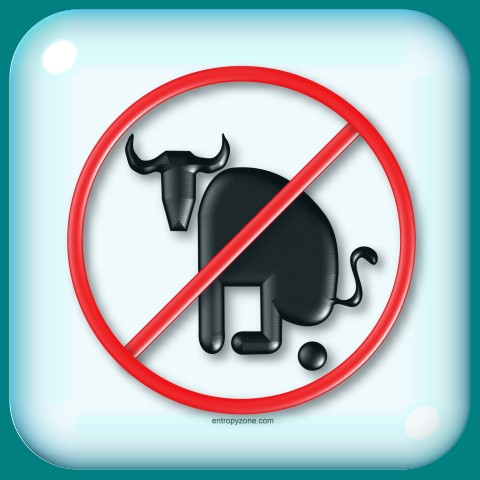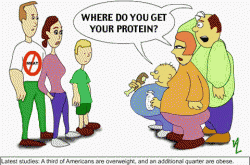Update via The New York Times: “A study published last March found a 75 percent increase in premature deaths from all causes, and a 400 percent increase in deaths from cancer and Type 2 diabetes, among heavy consumers of animal protein under the age of 65—those who got 20 percent or more of their calories from animal protein.” Read the full article.
~
The Nutrition Myth that Just Won’t Die
Five of the many things I learned during my 15-month stint as a raw vegan:
1. You can live – thrive — on just vegetables, fruits, nuts and seeds.
2. What we eat has a huge and immediate effect on our well-being.
3. We really don’t need much protein.
4. Complete protein is a myth.
5. Everyone who eats considers themselves a nutrition expert (see #3 and #4).
When I was “raw,” I positively glowed, so points 1 and 2 were readily apparent to most anyone who saw me. Confounded, people would often harrumph, “Well where do you get your protein?”
Ah, the protein question. I’d smile and explain that there’s plenty of protein in a vegan diet (even one without grains or beans!), that humans don’t really need as much protein as the meat and dairy and “fitness” industries would have us believe, and that, in fact, too much protein (especially animal protein) has been overwhelmingly correlated with cancer (both in the lab and epidemiologically).
Enter points 4 and 5. People would pause, rummaging through their What To Say To A Vegan file, and triumphantly display the “complete protein” clause: “Yes, but plant protein is incomplete protein, and so you need to be really careful to combine foods properly so you’re not deficient!!!” Then they’d look at me with a strange mixture of smugness, concern, and confusion.
The Great Complete Protein Myth has been recanted over and over and over again, but people insist on continuing to believe it. Not only that, they propagate it further by repeating it without checking their sources. Look, I’m not here to tell you never to eat meat or dairy — that’s your business, and if it works for you (and you’re sourcing it in as ethical a way as possible), great. But please don’t eat animal products because you think you need to, because that’s false and often harmful; and please don’t tell vegans they’re going to be protein deficient or need to take special care to combine their proteins because that’s false and really annoying; and let’s please have some humility about our nutritional expertise and open our minds to the possibility that we’ve been fed (no pun intended) some inaccurate information.
So here’s the low-down:
All protein, whether from eggs or foie gras or cauliflower, is made of amino acids. Of the 22 standard amino acids, there are eight that the human body cannot synthesize from other compounds: we must get these directly from our diet, so they’re called essential. The infamous eight are: isoleucine, leucine, lysine, methionine, phenylalanine, threonine, tryptophan, and valine.
While all animal foods contain all of those 8 amino acids, not all plant foods do (or, rather, some plant foods contain one in only trace amounts).
In her 1971 classic, Diet for a Small Planet, Frances Moore Lappé suggested that plant proteins were incomplete, and so vegetarians had to pay special attention to food combining to ensure they got complete protein (e.g. combining beans and rice). This suggestion has since been found unnecessary, and Lappé herself recanted her position in later editions of the book:
plant proteins were incomplete, and so vegetarians had to pay special attention to food combining to ensure they got complete protein (e.g. combining beans and rice). This suggestion has since been found unnecessary, and Lappé herself recanted her position in later editions of the book:
In 1971 I stressed protein complementarity because I assumed that the only way to get enough protein … was to create a protein as usable by the body as animal protein. In combating the myth that meat is the only way to get high-quality protein, I reinforced another myth. I gave the impression that in order to get enough protein without meat, considerable care was needed in choosing foods. Actually, it is much easier than I thought.
With three important exceptions, there is little danger of protein deficiency in a plant food diet. The exceptions are diets very heavily dependent on [1] fruit or on [2] some tubers, such as sweet potatoes or cassava, or on [3] junk food (refined flours, sugars, and fat). Fortunately, relatively few people in the world try to survive on diets in which these foods are virtually the sole source of calories. In all other diets, if people are getting enough calories, they are virtually certain of getting enough protein.
Plant-based diets contain plenty of protein.
A varied vegan diet contains plenty of all the amino acids.
Our bodies store amino acids, so even if you don’t get all eight essential amino acids in one meal, it’s ok!!
The way we obsess about protein in this country, you’d think protein deficiency would be an epidemic. It’s not. In fact, excessive protein consumption is a far bigger concern in developed countries.
Protein’s a crucial part of our diet. In fact, it’s recently been suggested that meat (especially cooked) helped us evolve bigger brains. It’s quite possible that including some animal products in your diet might be best for you. But if that’s the case, it’s because of something other than this complete protein issue.
The fact that you eat food does not make you a nutrition expert any more than driving a car makes you a mechanic.
So that’s all, kids. Eat your fruits and veggies, and go on with your lives. May all beings be loved and well fed.
For more info, check out these great sources:
 Share on bsky
Share on bsky







Read 50 comments and reply